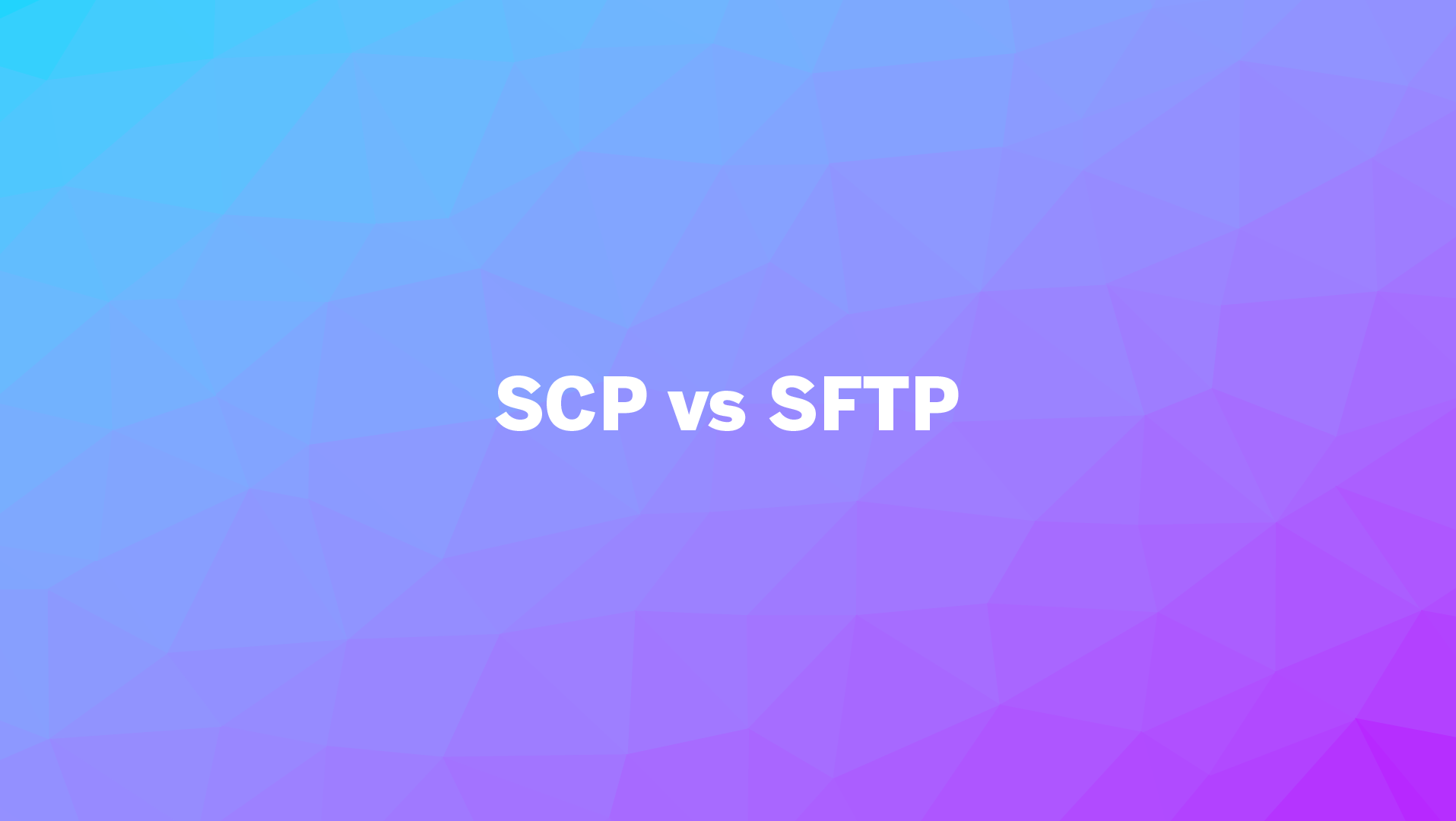Are you wondering what is difference between SCP and SFTP and which is better?
SCP and SFTP are both SSH-based protocols for transferring files between two machines. SCP is simple, easy to use, and provides faster transfer speed, while SFTP is more advanced and supports resume capability and directory synchronization. They both have advantages and disadvantages; choosing the right tool for you depends on your needs.
In this blog post, I’ll discuss the details comparison between SCP vs SFTP and when to use them.
Table of Contents
SCP vs SFTP
Secure Copy (SCP) and SSH File Transfer Protocol (SFTP) are both SSH-based protocols to transfer files between two machines. Though they share some similarities and provide the same security feature, they differ in transfer speed, file managing capability, resume capability, and more. Here is a comparison chart for SCP vs SFTP.
| Features | SCP | SFTP |
|---|---|---|
| Transfer speed | ✔️ (Faster) | ❌ (Slower) |
| Encrypted transfer of files | ✔️ | ✔️ |
| Authentication with SSH | ✔️ | ✔️ |
| Transfer of directories and files | ✔️ | ✔️ |
| Resume capability | ❌ | ✔️ |
| Directory synchronization | ❌ | ✔️ |
| Remote file editing | ❌ | ✔️ |
| Automatic compression of data | ✔️ | ❌ |
| Copying of symbolic links | ✔️ | ❌ |
| Complexity | Simple | Complex |
| Configuration | Easy | More difficult |
| File and directory permissions | Limited support | Full support |
SCP Overview
SCP is a command line tool for transferring files. It is a simple protocol for transferring files from the remote server to the local, local to the remote server, and remote server to a remote server. With SCP you can transfer files between two machines with a single line of command. SCP is commonly used in Linux and Unix Like operating systems and supports essential transfer capability.
Features of SCP
- Secure file transfer
- SSH Authentication
- Transferring files and directories
- Automatic compression of data
Advantages of SCP
- Speed: SCP provides better transfer speed compared to SFTP. This is an excellent advantage over SFTP, which suffers from slow transfer speed.
- Security: SCP is used Secure shell to authenticate with the server and provides the same security feature as SSH. Hence ensure a secure copy.
- Compression: SCP automatically compresses data when transferring hence reducing the file size
- Usability: SCP is more straightforward to use than SFTP. You can transfer files with a single-line command.
Disadvantages of SCP
- Integrity: SCP doesn’t check file integrity when transferring files.
- Resume Capability: SCP doesn’t support resume capability, so if your transfer interrupts, you need to overwrite the transfer with a new file transfer.
- Remote file Editing: SCP doesn’t support remote file management. If you need to manage files in your remote server, you may need to log in to the remote server SSH Connection to manage files.
- Directory Synchronization: Unlike SFTP, SCP doesn’t support directory synchronization
When to Use SCP
SCP is suitable for one-time files and directory transfer. It is easy to use and beginner friendly, so if you are unfamiliar with the command line, SCP will cover your need with fewer commands. If you have a good internet connection and want to copy or move data from a local host to a remote server or vice versa, SCP is suitable for you as it supports faster transfer speed.
SCP is also ideal for small file transfer as it doesn’t support resume capability, which may need for very large files. It is a simple protocol to get your job done. If you need more advanced tools, then consider SFTP over SCP.
SFTP Overview
SFTP is a secure alternative to popular File transfer protocol (FTP). SFTP is feature rich protocol that supports a variety of functionalities. Unlike SCP, SFTP is a more advanced tool requiring certain command-line interface expertise. SFTP also uses SSH for authentication and provides the same security features as SSH and SCP. As a file transfer protocol, SFTP has both pros and cons.
Features of SFTP
- Encrypted File transfers
- Supports directory synchronization
- Transfer files and directories
- Remote files editing
- Resume capability
Advantages of SFTP
- Integrity: SFTP sends acknowledgment after each transfer block which will ensure file integrity.
- Resume Capability: SFTP supports interrupted file transfer, meaning if your file transfer faces interruption, you can resume your transfer, which is essential for larger files.
- Remote file Editing: You can manage your files remotely. SFTP supports making directories, removing empty directories, deleting remote files, and navigating between files and directories, which is useful if you are unsure about your remote file locations.
- File Permission: SFTP also provides better support for managing file permission.
Disadvantages of SFTP
- Speed: The main disadvantage of SFTP over SCP is its transfer speed. SFTP is 2 or 3 times slower than SCP.
- Usability: SFTP is more complex to set up, configure and use. Unlike SCP, it is not beginner-friendly.
- Support: All servers do not support SFTP
When to Use SFTP
SFTP is suitable for managing remote files. If you need to synchronize your local directory with a remote server, then SFTP is the best option. Also, if you have a large amount of data, you can use SFTP as it supports resume capability.
SCP vs SFTP: Which is Better?
Choosing the proper file transfer protocol can save you time and complexity. When choosing the best option between SCP vs SFTP, there is no right answer, and it depends on your needs.
Security
Both SCP and SFTP use Secure Shell (SSH) as the backend and provide the same security as SSH. So in terms of security, both SCP and SFTP are secure, and you can choose one of them.
Winner: Tie
Transfer Speed
SCP is faster than SFTP because it doesn’t need to acknowledge file integrity. So SCP is better for small amounts of data, while SFTP is better for large amounts of data as it supports interrupted file transfer and directory synchronization.
Winner: SCP
Features
SFTP supports more feautres than SCP. SCP can only copy files and directories from one machine to another. The SFTP fully features a file transfer protocol. SFTP allows navigating between directories, making and deleting directories, removing files, directory synchronization, resume capability, and more.
Winner: SFTP
Easy to Use
SCP is simple than SFTP and more beginner friendly. You can copy files with just one single command. While SFTP is more complex to set up, configure, and use. So, SCP is better suited for beginners, while SFTP is better suited for more advanced users.
Winner: SCP
Interrupted File Transfer
SFTP support interrupted file transfers and also supports resume capability. If you don’t have a stable internet connection or if you have large amounts of data, then SFTP is better suited for you.
Winner: SFTP
Conclusion
SCP and SFTP are both SSH-based file transfer protocols. Though they share some commons function, they also differ in some features and functionalities. We provide details comparisons for choosing the right option for you. You can read more about our SCP and SFTP articles




